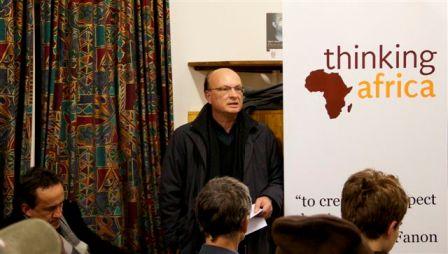
A three-day colloquium under the theme “Fanon 50 years later” was hosted by Rhodes’ Department of Political and International Studies’ last week as part of their launch of their flagship project, Thinking Africa.
The launch included a keynote address by internationally renowned philosopher, scholar and author, Professor Valentin Yves Mudimbe of Duke University in the United States.
Prof Mudimbe’s lecture provided an overview of the critical contributions made to postcolonial studies by French psychiatrist, philosopher, revolutionary and writer Frantz Fanon.
Born in Martinique in 1925, Fanon’s work was influential in the fields of post-colonial studies, critical theory and Marxism. Known as a radical existential humanist thinker on the issue of decolonisation and the psychopathology of colonisation, Fanon’s life and works have inspired anti-colonial liberation movements for more than four decades.
A panel, including leading Fanonian scholar, prolific author, activists and politically engaged academic, Professor Lewis Gordon (Temple University), Mr Ayanda Kota (chairperson of the Unemployed People’s Movement), Professor Pumla Gqola (academic, feminist and author from Wits University), Professor Grant Farred (professor of Africana Studies and Research Centre at Cornell University and president of South African Shackdwellers’ Movement), Abahlali baseMjondolo and Mr Sibusiso Zikode came together to share their views on why Fanon’s work is of such importance.
Fanon analysed the role of class, race, national culture and violence in the struggle for national liberation. Along with Black Skin, White Masks, Wretched established Fanon as the leading anti-colonial thinker of the 20th century.
Prof Gordon spoke of Fanon’s contribution to philosophical thought and rethinking of African colonialism, and alluded to the complexity of African identity. “Africa is a question mark; it is not a monolith. Things associated to being black are linked to things that are associated with not being,” he said.
Prof Pumla Gqola, associate Professor of Literary, Media and Gender Studies at the School of Literature and Language Studies, University of the Witwatersrand, spoke of how she came to Fanon’s work through black consciousness. Having recently had her book, What is slavery to me? Postcolonial/slavery in post-apartheid South Africa, published, Prof Gqola said she finds Fanon’s work useful as it “enables us to speak critically on globalisation discourse that increasingly speaks of a flattening of power… and allows us to craft a… critical language and new tools for revolutionary subjectivity.”
Mr Ayanda Kota spoke of the general lack of acknowledgement of the poor’s capacity for rational intelligent thought, especially by the wealthy, an issue highlighted by Fanon. “The elite take us for granted. To them all we are is a bunch of lazy, dumb people who expect government to do everything for us,” he said. He said poor people have an ability to come up with solutions to their plight, and referred to Fanon’s contribution to this train of thought. “Fanon was correct; there needs to be a change in consciousness, both national and social,” he said. Mr Kota also alluded to the meaning of freedom, saying; “Independence does not mean freedom.”
Mr Zikode agreed with many of Mr Kota’s sentiments, highlighting the common perception that the poor are unable to suggest solutions to their plights. “We are against the perception that shack dwellers can’t think for themselves, on the basis that we have had to think deeper. There are also shack intellectuals,” he said. He added, “Fighting for dignity is not easy; when we protest we protest because we want to get our dignity back.”
Prof Mudimbe delivered his keynote address and spoke about the “perplexing idea of epistemological violence and how to understand cultural difference”. With reference to Fanon’s work, Prof Mudimbe highlighted how “the black personality should be understood in its extremely dynamic intricacy”.
As one of the most prominent, incisive and celebrated postcolonial intellectuals from Sub-Saharan Africa, Prof Mudimbe has held academic positions and professorships in Belgium, France, the Democratic Republic of Congo and in America (Haverford, Stanford and Duke). He is the author of several books including The Invention of Africa (1988), Parables and Fables (1991), The Idea of Africa (1994), Tales of Faith (1997), Nations, Identities, Cultures, editor (1997) and Diaspora and Immigration, editor (1999).
Thinking Africa was launched in 2010 and seeks to unify a number of national, institutional, research and teaching related demands in a post-graduate project that will encourage student participation in staff members’ research projects. All the projects relate to Africa in some way and the project aims to contribute to existing academic work on Africa while also contributing to attempts to rethink the study of Africa.
Story by Sarah-Jane Bradfield
Picture by Hailey Gaunt
